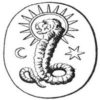The concept of the Demiurge is actually more broad than might be assumed. For most, belief system in the beginning was chaos. A formless or hyper ordered state beyond human comprehension, and the divine being, the first consciousness, tends to dwell in or arise from this.
Now in an effort to understand the consciousnesses that proceeded, our own mind sort of intuitively identifies the powers that be. The major players in how the world seems to work. Orthodox Catholics deride this and pantheism, but in fact it is more a sort of deism. An understanding of divine order or God in the machine. One of the things that gets commonly noticed though, is that these guiding forces don’t necessarily seem to be on the same page.
Essentially these first beings could be likened unto the very first observers, but there seem to be two broad orders of observers;
- Those who remain in touch with the macrocosm.
- Those that for one reason or another seek to set themselves apart, and declare that, “Thou shall have no God before me.”
The original state is often compared to water as it was in the Japanese creation story, and the Indian, and the Bible even. At first, everything is pretty much in order, everybody playing their role so to speak, but in the case of the Demiurge (and this being goes by many names) it sought “creation.” To set something apart from the total potential. In a sense, it was the first rejection of the oneness that so many schools of mysticism seem to focus on.
What are some of it’s other names? Ah, Samael, Ahriman, Jaldabaoth.
Rejection? Yes. The Demiurge refused to include the other observers and Iao itself called in Chinese belief the Tao. So while it was off being sort of narcissistic (and this issue still exists to this day), it came under the indirect influence of one of the other beings who also goes by many names, and its vision was guided to provide the new creation with a potential it wouldn’t have.
Just because it wouldn’t include them, doesn’t mean they didn’t include it, yes? Exactly. So when the Demiurge was done, it looked at it’s creation and was surprised at how perfect it was, but it wasn’t totally perfect.
Who was he under the influence of? Just before the appointment of Shatian, Jaldabaoth, Ahriman, the separate divinity. The demiurge was guided by Sophia, first wisdom. In Greek, the goddess Nox, or night, and thus was there the first period of rest, and that is when the potential of the world was first actualized.
How was it not perfect? Well, the Demiurge wanted a contained system. It wanted it to be limited and perfectly orderly, but it’s peers sought for more. The Demiurge is also known as Baphomet, is hermaphroditic, and it sought to deny humans a comparable power to it’s own and divided the potentials.
Like an ant farm? Yes, and is part of why even to this day people feel like ants.
Yin, yang, male, female, duality, fun? Was successful? Not entirely in eating of the tree of knowledge. And knowledge has been symbolized as a tree in many belief systems, the Norse, the Druidic.
Demiurge would not like humans venturing off into space like we are doing now? No. It doesn’t like that. It is part of why we have had some odd things happen, and people have an inexplicable paranoia regarding aliens and such.
You mean it may have caused accidents? It’s still governing a lot of what I refer to as probability matrixing.
Seeds us with a fear? Yes, but in humanity a seed was planted. A force called chi, kundalini, a force that we are taught to fear.
Someone gave us curiosity though? Yes, the others. The “serpent force” most directly. Our reptile brains would have been totally dominant, and basically creative reason beyond us if it weren’t for an intervention. So things went, the orthodox powers that be don’t like their “contradictions” being talked about, the Kabala and such. And Gnosticism is just supposed to be “the work of false prophets.” It even was in the Greek ecclesiarchy before Christianity spread there. Plato was more of the “heretical” strain. Gnostic is what platonic method in teaching was based on, that we have access to knowledge beyond our brains.
Gnosis, life energy, chi? Actually, yes. Plato and other Greek mystics were much concerned with a secret fire. Zoroaster was the bearer of this fire to the Persians, and he lead a movement excluding placation of Ahriman who was seen to be the tyrannical harsh petty side of Ahura Mazda, Lord Wisdom, aka Sophia. It is covered in both the fall of Icarus and the story of Prometheus. Prometheus was the bringer of the fire to early man, a Titan from the age before humanity. When he brought the fire from off of the cosmic axis (the world tree again, same image), Mount Olympus, he was villanized. When man later would seek to explore this fire, fly into the field of awareness, a.k.a. the astral plane. The Demiurge reinforces the limits of the human brain, making it mistranslate what it encounters and make mistaken decisions. In the metaphorical case fly too close to the sun.
Fear? Yes, always fear.
Your thoughts are welcome. Be well friends.
Travis Saunders
Dragon Intuitive
~science,mysticism,spirituality~



Leave a Reply to A-M-(Sophia?) Cancel reply